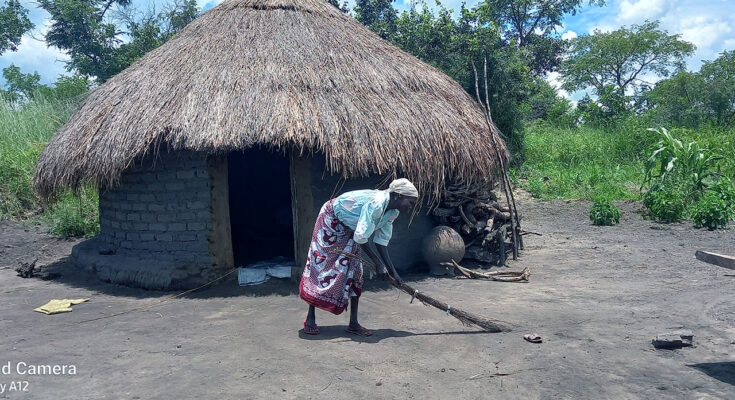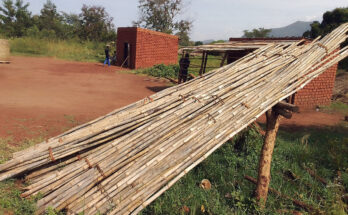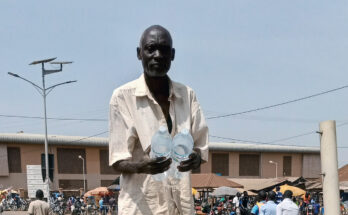PHOTO: Aketo, a 70-year-old widow cleaning up her compound after returning from her garden-Photo By Simon Wokorach
In March 2006 as her dead husband was being mourned, the land he left was quickly occupied by his half-brothers. Trouble ensued and Aketo had to halt her resettlement plans from the very land she once toured and was handed over, though verbally to provide shelter to her children.
Opara, a village in Amuru district, derives its name from the nearby stream (Opara) that provides its residents with drinking water and also feeds them with mudfish. It stands in the highlands, approximately 6 kilometers off Gulu- Nimule road to South Sudan.
The roads into the villages are generally impassable but the harvest from the crops attracts people from far and near. September is a busy month with villagers harvesting and planting new crops; some battling the wild birds seeking food in their rice gardens.
Off the valley is Paska Aketo, aged 70, cleaning up, as she prepares to receive visitors. The last time she had received foreign visitors was more than 20 years ago when investigators from the high court had come for fact-finding on her lawsuit over land violence.
Her solitary grass-thatched house is surrounded by approximately a quarter of a garden of simsim and sweet potatoes.
“I prepared the garden late this year and this will be the first harvest in my own land after so many years when I couldn’t set foot here,” the mother of 6 wistfully looks back, as she puts down the plastic chairs she had borrowed from the neighborhood to host guests that included journalists.
September 1996
September 1996 brings sad memories to Aketo. As government soldiers battled the rebels of the Lord Resistance Army, Aketo lost her herd of 26 cattle to suspected Karamojong rustlers. Up to 71 others were lost earlier when the National Resistance Army invaded the area, pursuing the rebels.
Indiscriminate arrests were allegedly commissioned by the army as they searched the entire village for the rebels and their collaborators. Seven people from her home including her father-in-law who was in his 80s were among those arrested and disappeared along with four others. Two returned home beaten and weak but could not tell what happened to the others. The villages were declared a no go zone and residents were forced to leave for IDP camps.
Everyone was asked to leave their ancestral land, with all their harvests abandoned in the gardens, and settle for a new life in gazetted areas for internally displaced people camps. Aketo ended up in Pabo which turned out to be the largest protected area.
“My late husband didn’t want to leave and he was looking for the whereabouts of his father who was picked by the army but I had to leave with the children. He later joined us in the camp but was very weak. He was beaten by the Army who mistook him as a collaborator,” Aketo said. The living conditions in the camps were tragic but Aketo had to endure for as long as she wished to live.
By 2006, the guns had fallen silent and everyone was seeking to resettle in their ancestral land. It was good news to everyone who survived and there was no delay.
In his late 60s, Aketo’s husband, who had been tortured after being suspected of being a rebel collaborator in the early years, died soon after the guns went silent, but not before he showed her the boundaries of their ancestral land.
“One day, my late husband asked me to go with him in the bush but he was sick and weak. I was afraid he would kill me there. But when we reached, he moved with me showing the boundary and telling me that I should remember it well once he was not there. I didn’t ask him why but I was troubled and knew I was already a widow,” she recalls the last day with her husband in the jungle.
In March 2006 as the departed husband was still being mourned, the land he left was quickly occupied by his half-brothers. Trouble ensued and Aketo had to halt her resettlement plans from the very land she once toured and was handed over, though verbally to shelter her children.
She explored several options to reclaim her land; ranging from the local council courts to mediation. Ten years later, the sub-county land tribunal ruled in her favor, but it only created more trouble for her despite the fact she temporarily gained the legal rights of ownership.
In the early hours of June 4, 2017, her in-laws mobilized to evict her. Forty of them, each with at least a machete and a spear invaded her home. Having lost in the sub-county land tribunal, they sought to avenge the decision that had forcefully resettled Aketo in the contested land.
The attackers burnt down two of her grass-thatched houses, looting 6 of her cows and shs 1.5 million she had saved for supporting her already struggling family as she and her children fled home for their lives.
The close to 500 acres of land which houses more than 500 occupants were taken and Aketo was charged with the ‘purported murder’ of a juvenile and remanded to Gulu Central Prisons for nearly two years.
The prosecution later discovered that the child died from spina bifida, a birth defect that occurs when the spine and the spinal cord do not form properly, she was then acquitted and embarked on her long resettlement plans. But the conflict had escalated in the area, engulfing a hundred others along with Aketo.
They were all homeless when the local leaders in the area referred her situation to private investigators who examined the case and filed a suit in the Grade One Magistrate Court for legal protection from the contested land in Amuru.
Peace returns
The court was convinced by the outcome of the investigations and finally by March 2022, with much pressure from human rights activists, the accused opted for mediation, the consent judgment was then passed by the Amuru Grade One Magistrate Court which later ushered in tranquility in the area.
“Peace has returned and we have forgiven one another. We also took an oath and signed an agreement that our children will never again enter into any conflict even when we die,” Aketo cheerfully explains as new hopes for rehabilitation and resettlement emerged.
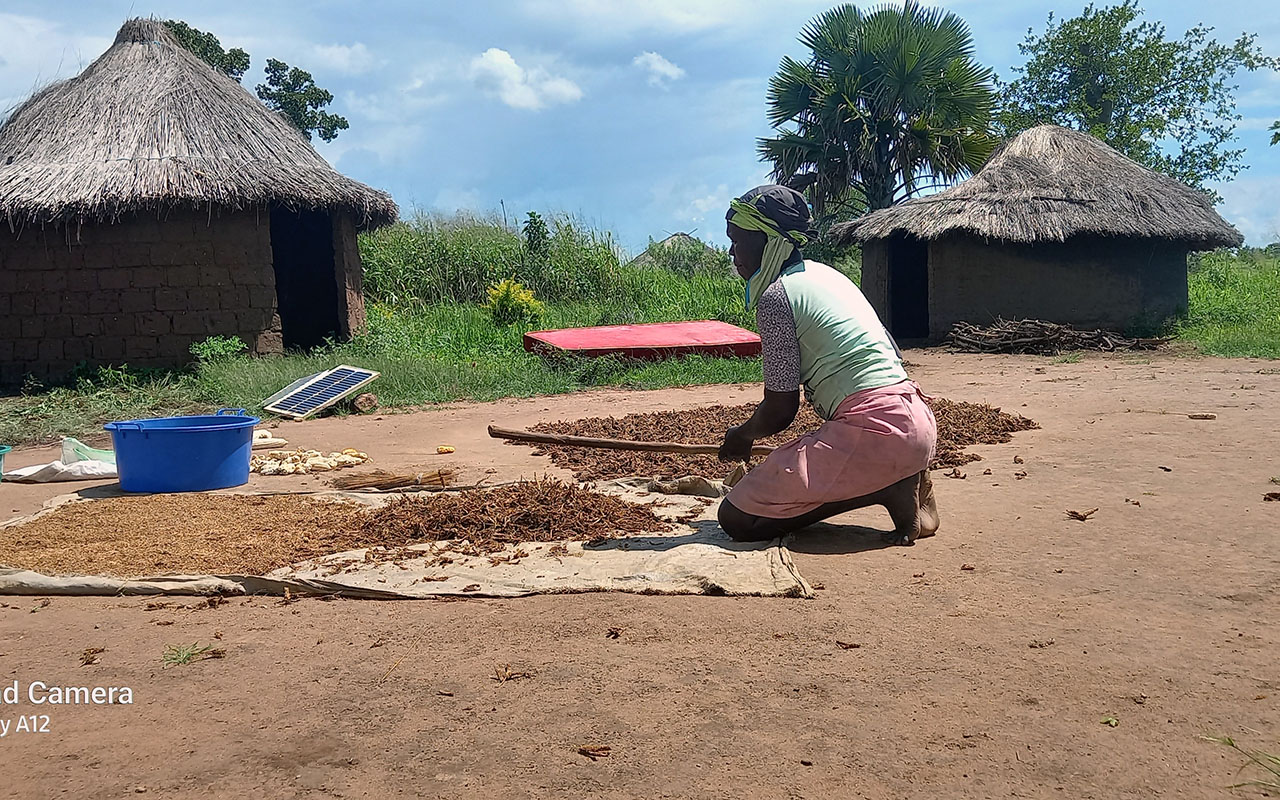
Legal flaws
Despite the constitutional and legislative guarantee to land in Uganda, critics say, the customary land tenure system still suffers from inadequate legal protection, a situation that has denied thousands of widows in Amuru District access to agricultural production, which is their main economic mainstay.
The Program Manager of Redeem International, a non-governmental organization advocating for land rights and protection in the district, James Komakech described the trends of land violence in the district affecting the widows as worrying. It hampers their means of survival, something he said should concern stakeholders who should seek equal opportunity for both men and women on land rights.
Records from Redeemed International show 1,038 widows who were displaced from their land between 2020 and June 2022 by their in-laws which deprived them of agricultural production, their only primary means of survival and economic empowerment.
Jacob Olum Garrison, aged 52, still remembers the devastating impact of land violence which did not only deny them economic recovery but turned the entire village into an illiterate population due to a lack of economic means to send children to school.
Of the more than 500 occupants of the area, only 7 of them were able to complete primary school and join post-primary education but subsequently dropped out from senior one and two respectively. The conflict ushered in rapid population growth as children became sources of protection, even though few cared about their future in education.
Olum has seen 9 grandchildren but none of his biological 7 children had studied beyond primary five as the family, alongside others got entangled in land conflict. Not surprising, Aketo’s firstborn in his 20s already has 5 children with two wives and is yet expecting more.
The old tradition is yet to change. Like in the past, the children here will have to forego school, learn farming and other domestic work with a bleak future as parents watch over them. “I didn’t go to school because of the war but the land conflict has also denied me the opportunity to look for money to educate my children and this is why none of us here has studied beyond primary level,” Okumu told this reporter.
Land disputes continue
As recently as Wednesday, September 7, 2022, several people had camped at Opara Sub County headquarters seeking mediation arising from land conflicts. “I have been out of the office for two days handling various land disputes which have overwhelmed us,” Sub County Chair Peter Lukwiya noted.
On that same day, when other children were going to school, one, Nighty Akumu aged 25 was harvesting her rice on about 2 hectares of land.
She had carried into the garden four of her children who were helping to chase away the swarm of wild birds from eating the rice which was ready for harvest. Their work is to shout and beat empty tins to make noises to repel the birds from landing on their crops and destroying them.
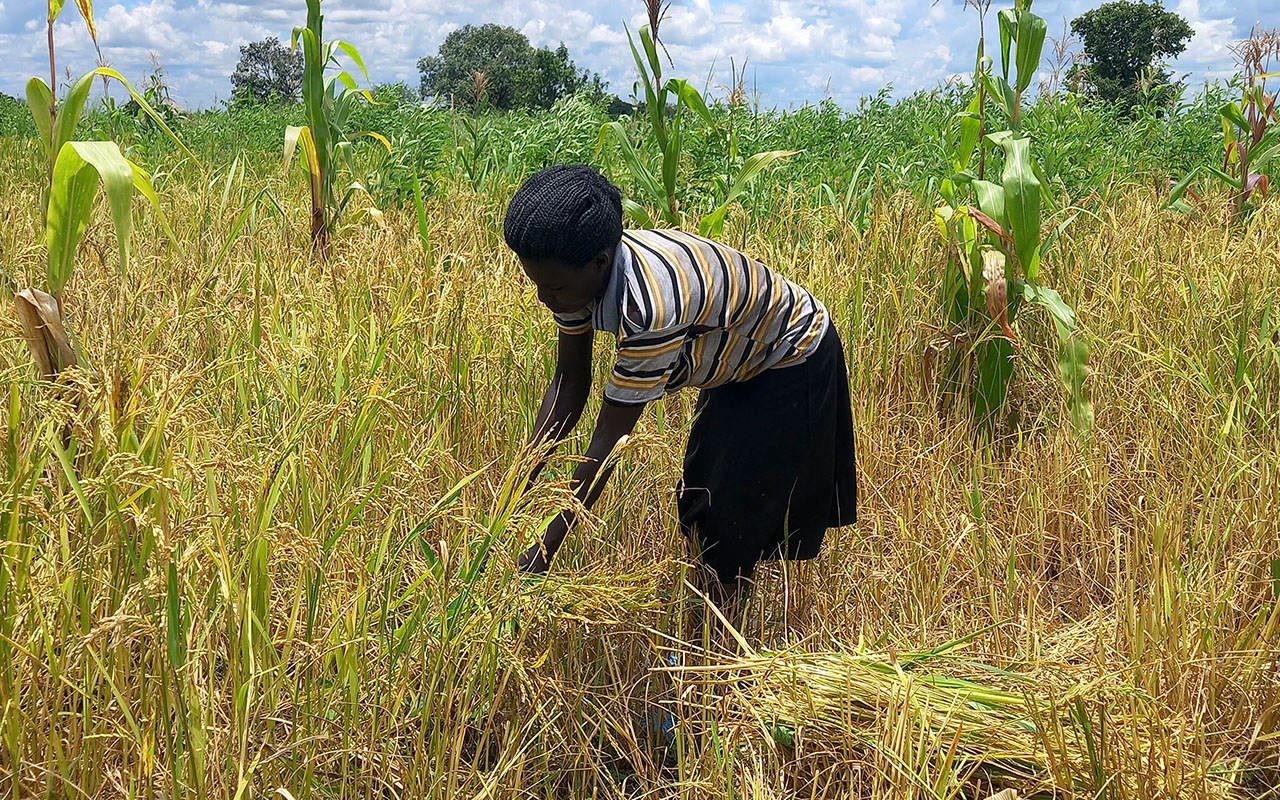
Whereas the Sub County is yet to enact a bylaw restricting the sale of land in the area, Lukwiya revealed that most of the land violence in the area is fueled by the local leaders (LCIs) who profiteer from the conflict gathering between sh100,000 shillings to sh200,000 from every land sale.
As of Wednesday, September 21, 2022, the records from the High Court Registry in Gulu indicate 772 cases of land matters alone as the Court battles backlogs to dispose of cases amidst resource constraints.
The records further indicate that, of 176 cases of land matters before the High Court, only two have been concluded pending judgment while 174 others are still committed for trial. The Court is also battling with 307 appeals challenging the decision by the lower courts in the region with only 15 cases concluded, pending judgment.
There were also 289 applications that the Court has received from the people whose land had been allegedly erroneously titled without their consent as they seek an injunction on the disputed land which the High Court has started hearing, 5 have been concluded while others are still on for trial.
To dispose of a single case from the High Court, the government will have to invest sh1,150,000 in the Court, and to expedite the overall cases would mean that the Court needs to spend 2.7 billion which will require 2,362 days of persistent litigation if no more cases arise but the land conflict has continued to rage on as people declined mediation and other means of conflict resolutions.
The Deputy Gulu High Court Registrar, Ntalo Nsulu Hussein, noted that most of the complaints registered involve widows and orphans who were allegedly evicted from their marital lands by in-laws and relatives and are battling for justice.
“The challenge we have is that the clans haven’t come to help the population which has just come out from the war. Someone will come and say this is my land but even these clan heads are at times directly involved in those conflicts,” Hussein said in an interview.
He revealed that the Court has received two High Court Judges who are yet undergoing training on the culture, norms, and traditions of the people from the region and the nature of land ownership before they are settled to handle the land cases expeditiously to ease the current backlog.
Cultural institution speak out
Ambrose Olaa, the Prime Minister of the Acholi chiefdom says the violence on land is due to a lack of a resettlement plan. Olaa explained that many of the elders who were knowledgeable about the land boundaries died in the camps and so the people who returned did not know where to begin from.
“These children who are involved in the conflict were born in the camps. They didn’t know their ancestral home and they could have been guided by the elders but as you know, we buried them in the camps. This is the challenge we face which the resettlement plan didn’t even care about,” Olaa observed.
He, however, noted that the different 55 chiefdoms have scheduled each Monday, Wednesday, and Friday for land tribunals so as to handle land-related conflicts and have been successfully mediating at least 7 cases of these conflicts directly involving widows and orphans on a weekly basis.
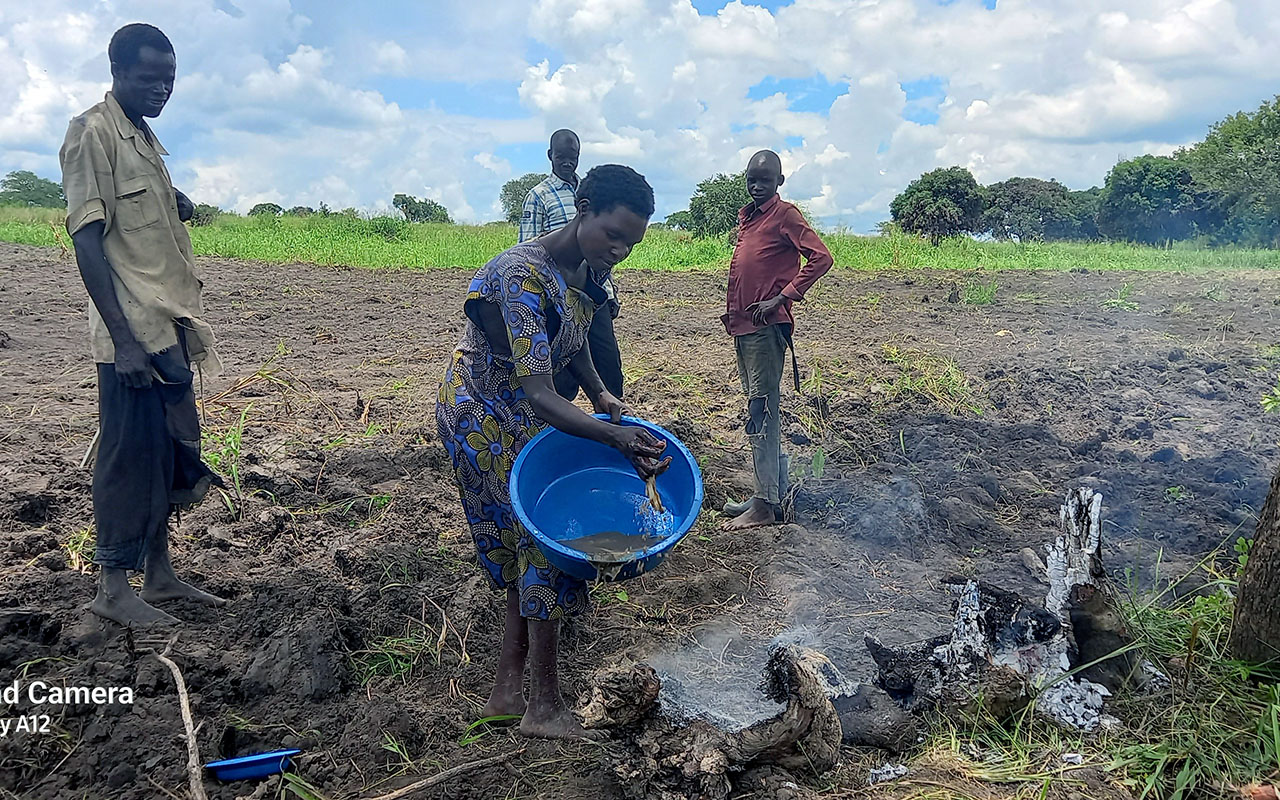
A new law in the offing
A new proposed law that is in parliament has provisions on the distribution of properties within a monogamous and polygamous marriage, separating the matrimonial property from the individual property. It also guides that spouses should make an agreement on property owned by both and those individually owned.
The bill further proposes that if a spouse acquired property before or during marriage and the property does not fall within the matrimonial property but his or her spouse makes a contribution towards the improvement of that property, be it monetary or in kind, the spouse without the interest shall acquire a beneficial interest equivalent to the contribution she or he made.
In the case of a polygamous marriage, matrimonial property acquired by the husband and the first wife shall be owned in common, and the subsequent wives will only take interest in the husband’s share of the matrimonial property.
Ugandan London-based economist Walter Atiko in his argument points out that, displacing women from agricultural production means denying them their livelihood support but also stagnating the economic recovery of the region as the women are chained in the kitchen to do only domestic work.
“The poverty we are talking about in Acholi isn’t just poverty but it’s extreme poverty, unfortunately, these women who are denied production can drive the economic growth of this region by 6 percent annually if they could actively participate in the different agricultural value chain” Atiko explained.
Whereas the current law in Uganda only cares about a married woman in case of such eventuality, Samuel Openy, a legal consultant on land rights protection with Awino Law Firm, argues that many women have been victimized under the pretext of the law where thousands are evicted as they struggle for livelihoods.
“90 percent of the land in Acholi is customarily held and women who are most affected are those who aren’t married yet but have cohabited for long. Many have been evicted but some have survived on the interest of their children on that land. For now, we can’t help such a mother but we hope that the current Bill on marriage and divorce shall address the legal gaps that we have,” Openy explained.
Women formerly abducted by the LRA rebels and children born of war
When Evelyn Laker returned from the captivity of the Lord’s Resistance Army 9 years after her abduction, she could not locate her home but later got linked to the family lineage who could not even receive her.
“I came back with a boy I was given to take care of. Though I didn’t know his biological parent, they rejected him on grounds that he was a stranger; but how could I abandon him yet he grew up knowing I am his biological mother? When I couldn’t let the boy go, we were all rejected,” Laker narrates her ordeal.
Like thousands of other women in the region who are battling for reintegration and recovery, Laker still has her struggle far from over as her in-laws evicted her with five children from her only 3 acres of land at Paduny village in Gulu District after her husband died since nobody has come to terms with the only child she came back with from captivity. There are hundreds of returnees who are suffering the same fate as Laker.
Simon Wokorach is a freelance Journalist having 6 years of experience in practicing Journalism with a special focus on environmental science, agriculture, biodiversity, and health. He is currently pursuing Bachelor’s Degree in International Relations and Security Studies at Gulu University.
The story was produced by a grant support from Northern Uganda Media Club (NUMEC) and published online on The Independent.

